Shopify vs BigCommerce: Which E-Commerce Platform Wins? (2025)

For businesses aiming to excel online, SaaS-based e-commerce solutions are an excellent way to keep up. Shopify and BigCommerce are two key players offering comprehensive e-commerce solutions. In an increasingly competitive online market, selecting the right platform is not only about features—it’s a strategic choice that can define a brand’s trajectory.
We have compared Shopify and Bigcommerce to help you choose the platform that best fits your vision. Let’s see which one comes out on top.
Shopify vs BigCommerce: Quick Comparison
| Feature | Shopify | BigCommerce |
| Ease of Use | Very Easy | Moderate (Steeper Learning Curve) |
| Subscription Fees | Lower | High |
| Transaction Fees | For Third-Party Processors | None |
| Storage/Bandwidth/Products | Unlimited | Unlimited |
| E-commerce Features | Good (May Require Additional Apps) | Comprehensive (Built-in Features) |
| Customization | Customizable Without Coding | Advanced (Requires Coding Knowledge) |
| Free Themes | Limited | Limited |
| Staff Accounts | Limited (Based on Plan) | Unlimited |
| Annual Revenue Limits | None | Yes (Upgrade Required for Higher Volume) |
| Advanced Features | May Require Higher-Tier Plans | May Require Higher-Tier Plans |
| Customer Support | 24/7 Support(Live Chat, Email, & Phone) | 24/7 tech support (Phone, Chat, & Ticket) |
| Ideal for | B2C, D2C, B2B, Dropshipping (Beginner-Friendly) | B2B |
Shopify vs BigCommerce: Which One is the Bigger Player?
As of 2025, Shopify is the top eCommerce platform in the United States, with a market share of 30%, powering over 2.5 million sites in the US alone. Globally, Shopify supports close to 5 million stores, indicating rapid growth and a dominant position in the market.
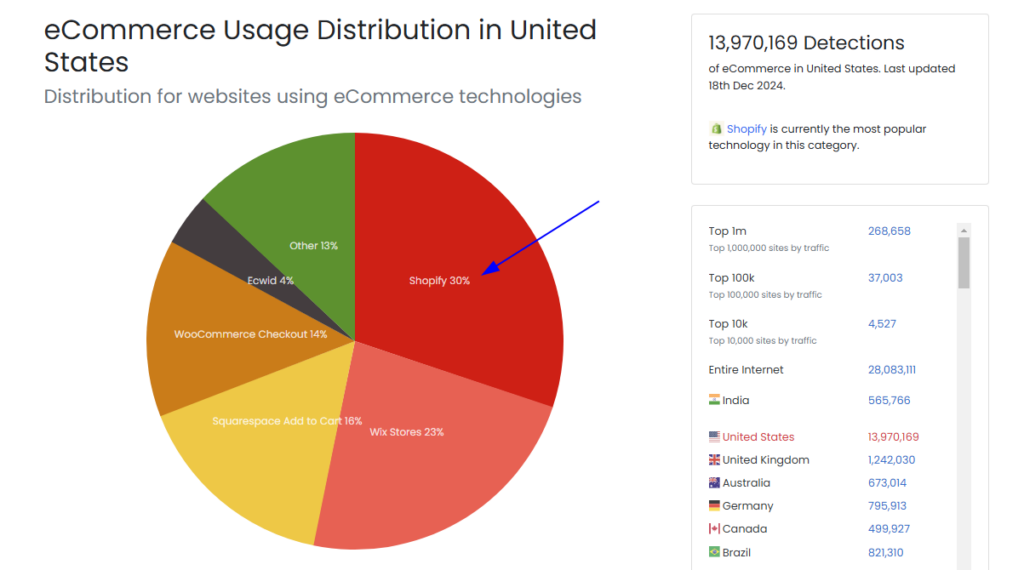
On the other hand, BigCommerce holds a smaller segment, with a market share of 0.31% and powering over 30,000 sites in the US.
These figures underscore Shopify’s position as the bigger name with a more extensive user base and a higher market share than BigCommerce, both in the United States and globally.
Winner: Shopify
Which Platform is More User-Friendly, Shopify or BigCommerce?
Both Shopify and Bigcommerce offer intuitive interfaces designed for entrepreneurs with no coding experience.
- Shopify is known for its exceptional user experience. Setting up your store is a breeze with a drag-and-drop interface and clear instructions. Adding products, AI product descriptions using Shopify Magic, managing inventory, and processing orders are all straightforward.
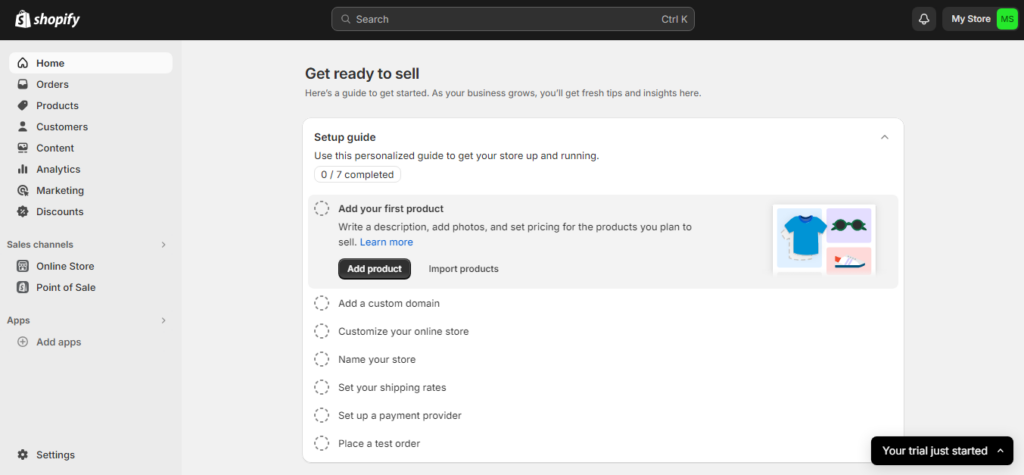
- Bigcommerce has a slightly steeper learning curve compared to Shopify. Its interface offers extensive options, which can be overwhelming for beginners.
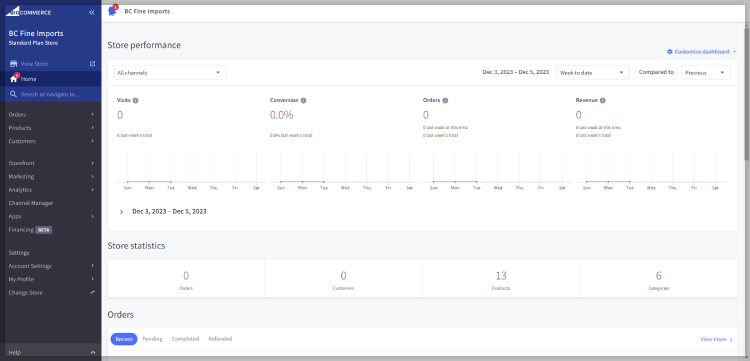
BigCommerce Dashboard Source: BigCommerce
Winner: Shopify
Which Platform Offers Better Designs?
Building a beautiful online store is key to converting visitors into customers. Shopify and BigCommerce offer a range of options for merchants to create an appealing online presence. Here’s a breakdown of how they stack up in terms of design options:
Theme Selection
Shopify themes are known for their beautiful, trendy designs. Shopify offers a wide variety with 13 free and 182 paid themes in their official Store, catering to various industries with trendy aesthetics. Prices range from $100 to $400, with previews available before purchase.
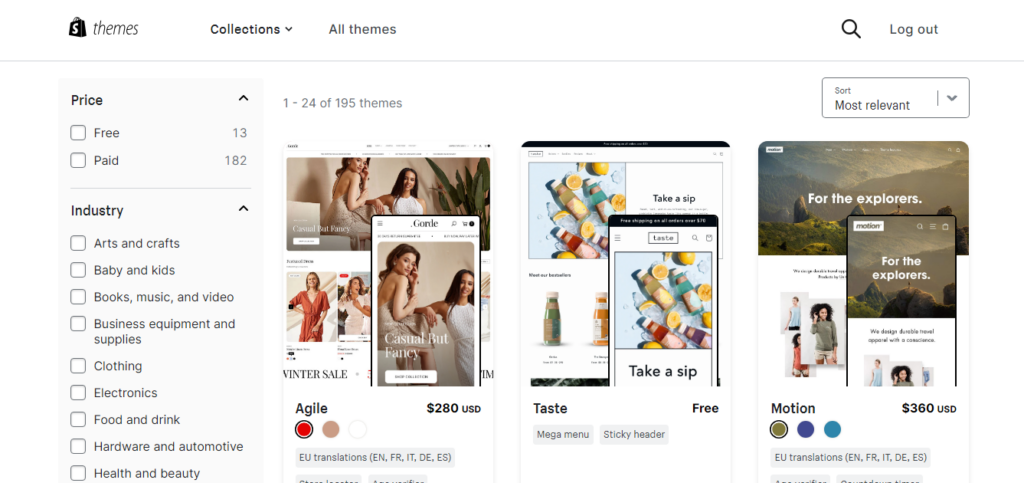
Bigcommerce provides 247 themes, including 12 free options with a focus on industry-specific designs. Paid themes are similarly priced ($100-$400).
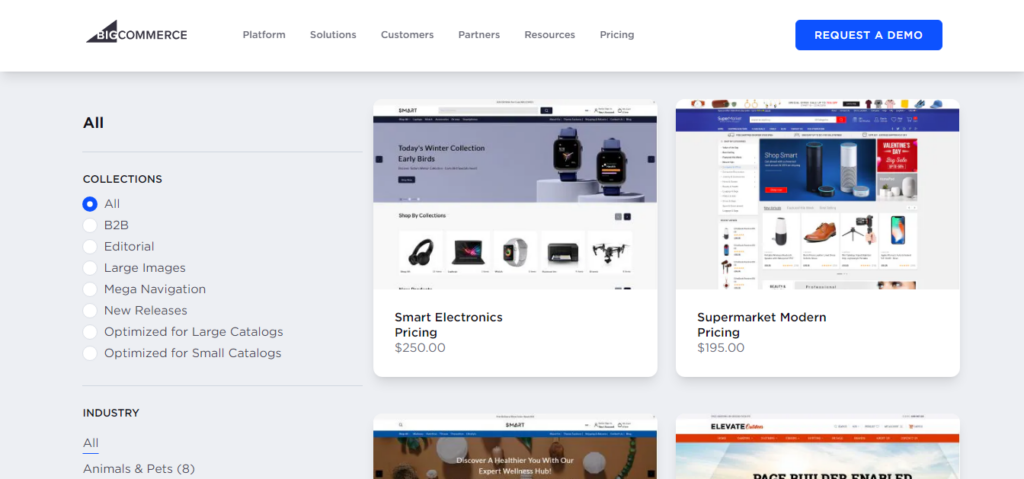
Both platforms allow third-party themes, but make sure they are compatible with the platform.
User-Friendly Customization
BigCommerce themes are known for their customization, especially for users with technical knowledge, as they allow for HTML and CSS customization and are AMP-enabled. This can be a barrier for non-technical users.
With Shopify, things become more user-friendly. Their theme editor shines for beginners who want to drag and drop their way to a great design without coding knowledge.
Mobile Responsiveness & Speed
Both platforms offer mobile-responsive themes that are automatically adjusted to different screen sizes. However, some users report occasional loading speed issues with heavily customized themes.
Design-Focused Apps
The Shopify app store includes many apps like Shogun Page Builder, PageFly Landing Page Builder, and GemPages that can really help enhance your store’s design. In contrast, Bigcommerce offers fewer design-focused apps than Shopify.
Winner: Considering the ease of customization, mobile responsiveness, load times, and design-focused app integrations, Shopify is the winner for offering better designs.
Who’s Got the Better App Store & Integrations?
Shopify’s App Store is known for its extensive range of third-party apps and plugins, With over 8,000 apps available in its app store. From marketing and conversion tools like Shopify Email, Klaviyo, and Mailchimp to reviews and advanced marketing tools like Judge.me, these apps cover a wide range of needs.
Shopify boasts strong integrations with popular services, including social media platforms, email marketing tools, shipping carriers, and accounting software. It also supports sales channels like Amazon and eBay, and offers built-in options for selling digital products. Recently, Shopify has also integrated channels like TikTok, Snapchat, YouTube Selling, and Microsoft Advertising.
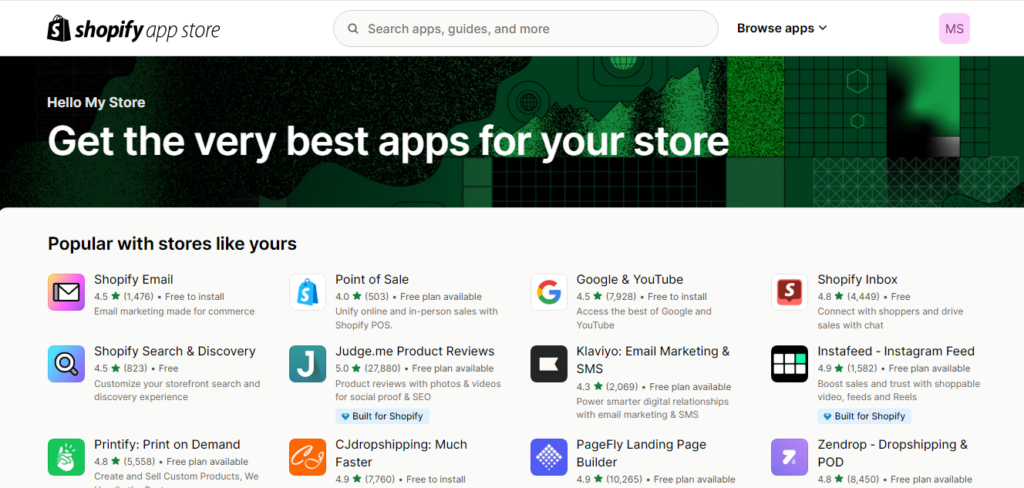
BigCommerce app store is not as extensive as Shopify. Instead, BigCommerce focuses on more built-in features and integrations that cater to businesses seeking comprehensive functionality without relying heavily on additional apps. It is particularly noted for its Enterprise Resource Planning (ERP) integrations, which can be crucial for larger businesses.
The platform also offers strong out-of-the-box SEO capabilities, which can reduce the need for additional SEO apps. It also allows for cart-level discounts and coupon codes without the need for third-party apps.
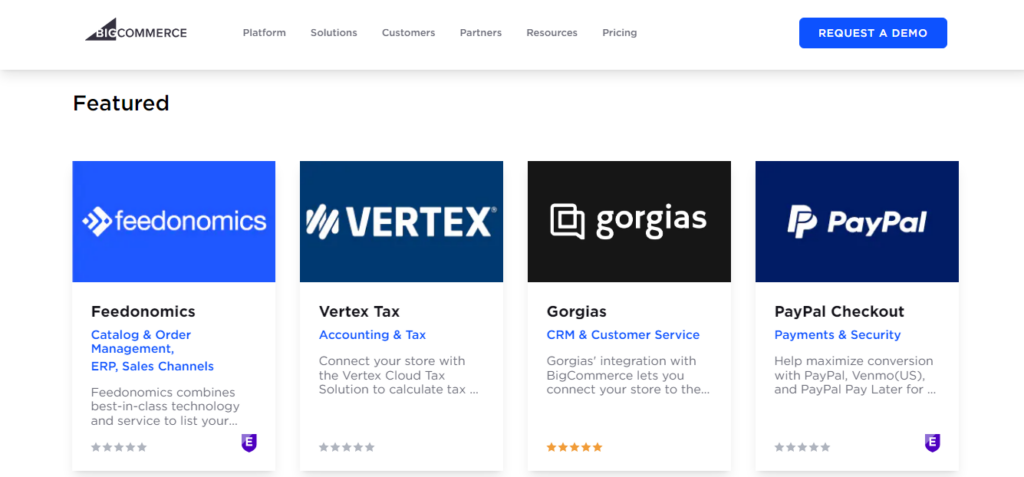
While BigCommerce offers a great deal of built-in functionalities, Shopify’s extensive third-party app ecosystem and essential integrations give it an edge over BigCommerce.
Winner: Shopify
Which Platform is More Secure?
Both Shopify and BigCommerce prioritize security for your online store. Here’s a breakdown:
Ongoing Security
Both platforms offer essential security features, such as strong password policies, two-factor authentications (2FA) or multi-factor authentications, limiting login attempts, inactivity thresholds, reCAPTCHA, regular updates, and advanced security policies.
Additionally, Shopify leverages its hosted platform model to manage many security concerns for its users. They also run a bug bounty program to incentivize the discovery and fixing of vulnerabilities and utilize risk analysis tools to detect fraudulent orders proactively.
Compliance
Both adhere to PCI DSS and Level 1 certification. BigCommerce goes the extra mile on compliance with ISO/IEC 27001, SOC 1 & 2, GDPR, and CCPA compliance.
SSL Certificates
- Shopify: Includes free SSL certificates for all plans. You can also install third-party certificates for additional features.
- BigCommerce:
- Free Dedicated SSL Certificate for custom domains.
- Paid SSL Certificates with varying security features (e.g., site seals, purchase protection) and pricing ranging from $59 to $299 (e.g., GeoTrust QuickSSL® Premium: $59.00 USD).
- Third-party SSL Certificates (Pro and Enterprise plans only).
- Stores without a custom domain use a shared SSL certificate.
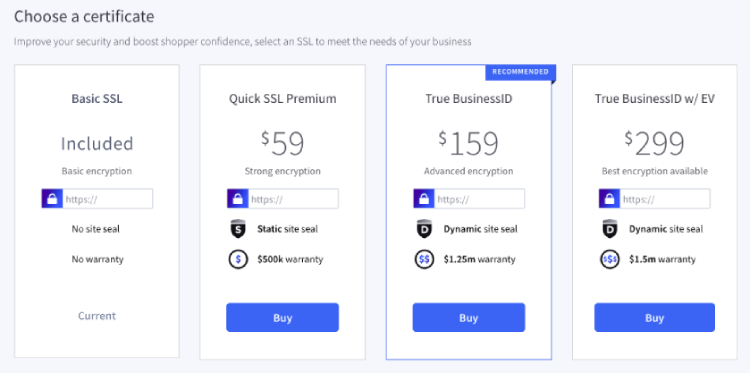
For more details about BigCommerce’s SSL certificates, please visit their official documents.
Winner: Tie
Who Got Better Sales and Marketing Options?
Both Shopify and BigCommerce platforms have their strengths. Let’s explore what each has to offer:
Conversion Champion
First impressions matter, and Shopify reigns supreme when it comes to checkout conversion rates. Studies show it outperforms competitors by a whopping 36% and boasts an average 15% higher conversion rate. This translates directly to increased sales and revenue – a significant advantage for any business.
While BigCommerce’s flagship checkout holds its own with a respectable 2.33% conversion rate, it falls short of Shopify’s dominance.
Staff Account Management
Both platforms understand the importance of efficient team management. They offer unlimited staff accounts, allowing businesses to scale their teams seamlessly. However, Shopify only gives you unlimited staff accounts with the Plus plan. So, BigCommerce wins here.
Marketing and Sales
Shopify takes the lead again regarding built-in marketing and sales tools. You can create custom email campaigns with pre-designed templates and optimize your store’s SEO through title tags and meta descriptions directly from the Marketing section in Shopify.
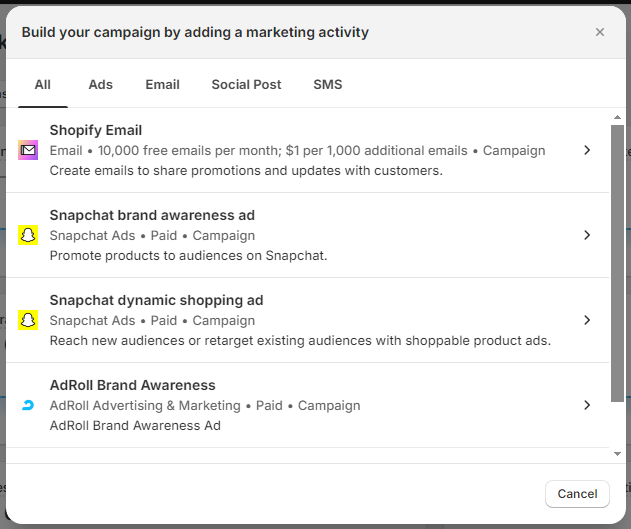
Shopify’s social media integration helps you to connect with your target audience on platforms like Facebook, Instagram, Snapchat, and TikTok. Social commerce is expected to grow 300% faster than traditional e-commerce, making this integration crucial!
Additionally, built-in abandoned cart recovery features help recapture lost sales opportunities, boosting your conversion rates further. Shopify also provides built-in blogging tools, allowing you to create content that drives traffic to your store and targets long-tail keywords for better SEO.
BigCommerce, however, focuses on different strengths. While it lacks built-in email marketing, it empowers you with valuable features like built-in product review capabilities and real-time shipping quotes, ensuring customer transparency.
Regarding selling channels, both platforms are strong for multi-channel selling, allowing you to expand your reach by selling across multiple platforms.
Product Variations
Shopify limits variations per item to 100, with a maximum of four options (e.g., size, color, material, style).
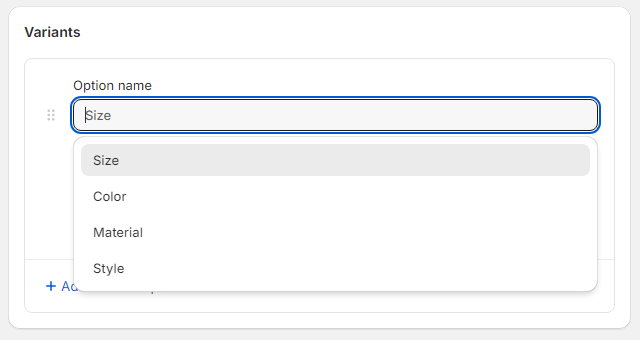
Businesses with complex product configurations, like clothing with various sizes, colors, materials, and patterns, might find this limiting. However, you can use apps like Infinite Options or SC Product Options from the Shopify App Store to add more product variations. These apps allow you to create unlimited options for your products. In such cases, relying on third-party apps within the Shopify App Store can add complexity and potentially increase costs.
BigCommerce comes to the rescue with a much higher limit – a staggering 600 variations per product and support for up to 250 options. This is perfect for businesses with a wider range of product configurations, allowing for a more granular and accurate product representation. You can simply add a new variant, configure variant images & values, and save it.

If your product has more than 600 SKUs/ variants, BigCommerce recommends using the “modifier option”.
Winner: Both platforms offer strong features. Shopify excels due to better checkout conversion rates and built-in marketing tools.
Point of Sale Solutions (POS)
Shopify’s POS is your one-stop shop. You can keep track of what’s happening in your physical store and online store all in one place. It’s easy to use, works on any device, and helps you keep track of your inventory, customer info, and sales data.
BigCommerce, on the other hand, connects with Clover POS. It’s got a lot of features, but it might take a bit more time to get the hang of it.
So, if you’re up for a bit of a learning curve and want a bunch of features, BigCommerce could be your jam. If you’re just starting out or want things simple and seamless, Shopify might be your best bet.
Annual Sales Limit
Shopify doesn’t impose any annual sales limits on its plans. This means you can scale your business freely without worrying about platform restrictions or forced upgrades. This flexibility can be particularly appealing for businesses with high growth potential or established brands with significant sales volume.
BigCommerce, on the other hand, enforces annual sales limits on their standard plans. These limits can restrict your growth if your business surpasses them. Here’s a quick comparison:
- Standard Plan: This plan allows for up to $50,000 in annual sales. Once you exceed this limit, you’ll be automatically upgraded to the Plus plan.
- Plus Plan: This plan offers a higher limit of $180,000 in annual sales. However, if you surpass this limit, you’ll need to upgrade to the Pro plan.
- Pro Plan: This plan has the highest limit of $400,000 in annual sales. Businesses exceeding this limit would require a custom BigCommerce quote.
Who Got Better SEO Features?
BigCommerce is often praised for its out-of-the-box SEO features. It provides optimized URLs for product, category, and other pages and ensures that each unique page has only one URL, preventing penalties for duplicate content.

BigCommerce also includes built-in metadata, or “rich snippets,” which enhance your search result listings with information like ratings, pricing, brand, and stock levels. If you rename a product, the auto-populated URL will adjust to reflect the name change and the old URL will be redirected to the new URL. Additionally, BigCommerce uses a special content delivery network (CDN) to ensure your site loads quickly for both shoppers and search engines.
While Shopify’s built-in SEO features might seem less extensive, it offers a significant advantage: a vast third-party app ecosystem. With nearly 600 SEO-related apps compared to BigCommerce’s 200, you can significantly enhance your SEO beyond the basic functionalities. These apps can greatly enhance your SEO capabilities beyond the built-in features. Shopify also allows:
- Logical store structure
- Sitemap submission
- Image optimization
- On-page SEO
However, it’s worth noting that some users have found Shopify’s SEO capabilities to be weaker in terms of content marketing.
Both BigCommerce and Shopify can integrate Google Analytics to get comprehensive reports on how users interact with their sites.
Winner: BigCommerce
Which Platform Has Better Payment Processing?
Selling online requires a seamless payment experience for both you and your customers. Payment gateways securely process credit card transactions and integrate with your online store. Both Shopify and Bigcommerce offer robust payment processing solutions but with some key differences:
Payment Gateway Options
Shopify boasts a wider selection of payment providers, with over 100 options. These include popular names like PayPal, Stripe, and Worldpay (now Verifone), offering flexibility for various payment preferences.
Bigcommerce, while not far behind, offers around 65 payment gateways serving 100+ countries and over 250 local payment methods. It offers integrations to the most popular digital and mobile wallets, such as Apple Pay, Amazon Pay, Venmo, and more.
BigCommerce supports credit card processors like PayPal, PayPal powered by Braintree, Stripe, and Adyen. It also supports Buy Now, Pay Later options like Affirm and PayPal Pay Later. BigCommerce provides offline payment methods like bank deposits, cash on delivery, and pay-in-store.
Regardless of your choice, both platforms support the major players, ensuring you’ll likely find a familiar and trusted gateway.
Transaction Fees
For most businesses, Shopify offers a more cost-effective payment processing solution, especially if you don’t require a highly specialized gateway. Shopify Payments eliminates transaction fees, and there are no fees for integrating a payment gateway with Shopify. Approximately 1.8 million merchants use Shopify Payments as their primary payment platform, representing up to 90% of all Shopify users.
Read more: What Is Shopify Payments? — Everything You Need to Know!!!
However, Shopify imposes an additional transaction fee if you opt for a third-party payment gateway. This fee is a percentage of the sale and varies by plan: 2% for Basic, 1% for Shopify, and 0.5% for Advanced plans.
The big difference is that Bigcommerce doesn’t charge transaction fees. You just pay your gateway’s standard credit card processing rates.
Winner: Overall, Shopify has a slight edge for most businesses.
Who Offers Better Value for Money?
While both BigCommerce and Shopify offer tiered pricing plans, the true value proposition goes beyond the monthly cost. Here’s a breakdown of their pricing structures, features, and potential hidden costs to help you decide which platform provides a better bang for your buck:
Shopify Pricing and Features
Shopify offers four main pricing plans, each designed to cater to different business needs:
- Basic: $19/month (billed yearly)
- Up to 10 inventory locations, 24/7 chat support, localized global selling (up to 3 markets), and POS Lite for in-person sales.
- Payment Processing: 2% fee for third-party payment providers (no fee if using Shopify Payments).
- Shopify: $49/month (billed yearly)
- Includes everything in Basic, plus up to 5 staff accounts, professional reports, and lower transaction fees (1% for third-party payments).
- Ideal for growing businesses needing more advanced features and additional staff accounts.
- Advanced: $299/month (billed yearly)
- Includes everything in Shopify, plus up to 15 staff accounts, advanced report builder, and even lower transaction fees (0.6% for third-party payments).
- Best for larger businesses that need custom reporting and higher transaction volumes.
- Plus: Starting at $2,300/month (on a 3-year term)
- Includes all features in Advanced, with unlimited staff accounts, fully customizable checkout processes, and the ability to sell wholesale/B2B.
- Perfect for enterprise-level businesses with high sales volumes and complex needs.

Additionally, Shopify offers a Starter plan at $5/month, allowing new merchants to sell products via social media and messaging channels, which is great for small or hobby businesses looking to get started with minimal upfront costs. For more details, visit official Shopify pricing.
BigCommerce Pricing and Features
BigCommerce provides four main pricing plans designed to scale with your business:
- Standard: $29/month (billed yearly)
- Unlimited products, file storage, and bandwidth, real-time shipping quotes, professional reporting tools, and no transaction fees.
- Suitable for new businesses that need a comprehensive solution without worrying about transaction fees or product limits.
- Plus: $79/month (billed yearly)
- Everything in Standard, plus an abandoned cart saver, customer groups and segmentation, and a persistent cart to retain customer data across devices.
- Ideal for growing businesses looking to increase conversion rates and customer retention.
- Pro: $299/month (billed yearly)
- All features in Plus, along with custom product filtering, Google customer reviews, and support for up to $400k in online sales per year.
- Designed for established businesses with high sales volumes that need advanced customer engagement tools.
- Enterprise: Custom pricing
- All features in Pro, with additional custom pricing and features tailored to specific business needs.
- Best for large-scale businesses requiring tailored solutions and dedicated support.
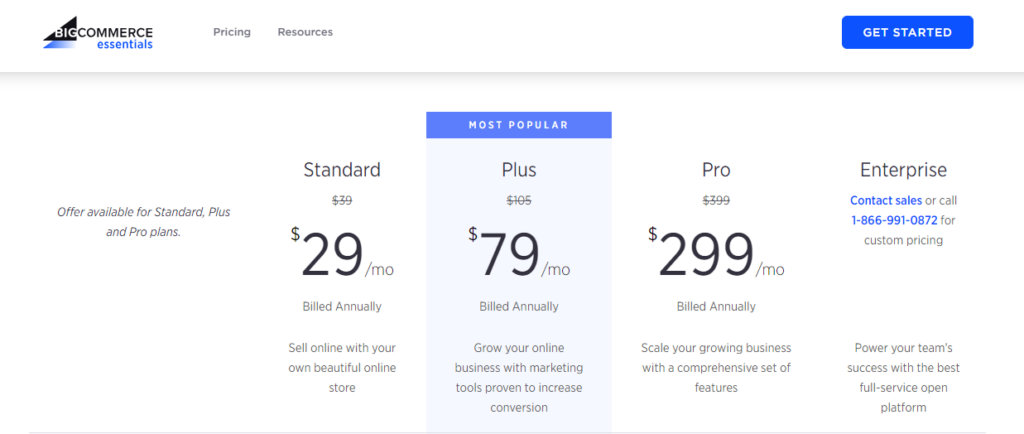
For detailed pricing, visit their official page.
Total Cost of Ownership
At a glance, Shopify appears to have a pricing advantage with a range of plans designed to fit different business needs. However, the key difference lies in what you get for the price.
Included Features
BigCommerce plans come with several advanced features right out of the box, such as professional reporting, a built-in ratings and reviews system, and real-time shipping rates. Additionally, BigCommerce does not limit the number of staff accounts on any of its plans, which can be a significant benefit for larger teams.
Shopify, on the other hand, includes an abandoned cart saver with all its plans, a feature that is only available on the Plus plan and above with BigCommerce. This can be a critical tool for recovering lost sales.
Sales Limits and Upgrades
A key difference between the two platforms is the sales limit imposed by BigCommerce. On BigCommerce’s Standard plan, your sales are capped at $50,000 per year, and on the Plus plan, the cap is $180,000 per year. Exceeding these limits requires upgrading to a higher plan. Shopify does not impose any sales limits, allowing for unlimited growth without the need for plan upgrades based on sales volume.
Transaction Fees
Transaction fees are another important consideration. BigCommerce does not charge any transaction fees, which can lead to significant savings, especially for high-volume stores. Shopify charges transaction fees ranging from 0.5% to 2% for transactions processed through third-party payment gateways, unless you use Shopify Payments.
Credit card processing fees are applicable on both platforms and depend on the payment processor used, such as PayPal, Stripe, or Amazon Pay.
Additional Apps and Features
While BigCommerce offers more built-in features on its basic plan, Shopify may require additional third-party apps to match these features, which can add to the overall cost. These apps can range from drag-and-drop builders to advanced reporting tools.
Despite this, Shopify emphasizes product investments aimed at reducing complexity and providing a streamlined experience for users, which can result in a better total cost of ownership in the long run.
Cost Comparison
An independent consulting firm on behalf of Shopify carried out a study that revealed significant differences in total cost of ownership across major platforms in North America:
- Platform Costs: Shopify’s platform costs are generally 23% lower than its competitors, whereas BigCommerce’s platform costs are 32% higher.
- Operating Costs: Shopify’s operating costs are 19% lower on average, while BigCommerce’s are 21% higher.
- Implementation Costs: Shopify’s implementation and setup costs are 33% better than the industry average, while BigCommerce’s are 88% higher.
A major reason behind this difference is Shopify’s accelerated checkout feature, Shop Pay, which significantly boosts conversion rates—up to 50% compared to guest checkout, outperforming other accelerated checkouts by at least 10%. This focus on user experience and efficiency translates into higher overall value despite potential additional app costs.
Winner: Shopify provides more value for money by focusing on simplicity and scalability.
Who Provides Better Customer Support and Resources?
Both Shopify and BigCommerce understand the importance of providing exceptional customer support to online businesses. They offer a robust suite of resources to ensure you have the help you need whenever you need it.
Multiple Channels for Convenience
No matter your preferred method of assistance, both platforms have you covered. You can reach out via:
- 24/7 Phone Support: Speak directly with a support representative for immediate, real-time troubleshooting (Shopify provides 24/7 phone support exclusively to Plus users).
- 24/7 Live Chat Support: Get quick answers to your questions through a convenient chat window.
- Email Support: Submit your questions and concerns via email and receive detailed responses.
- Self-Service Resources: Explore extensive Dev Centers, Community, Ebooks, Forums, and Video Tutorials covering a vast array of topics.
- AI Assistance: Both platforms integrate an AI assistant within their help center. This AI assistant personalizes your search experience by understanding your questions and suggesting relevant resources. It can also connect you with a live agent if needed. If you’re looking to integrate AI-powered support into your own business, Cybernews has an in-depth article on the best AI assistants, covering top tools that enhance customer service and automation.
While both platforms boast extensive help centers, Shopify takes the user experience crown with its embedded help prompts. These prompts appear directly within the Shopify dashboard and eliminate the need to sift through endless menus or search bars, saving you valuable time and frustration.
BigCommerce also offers a well-stocked help center, but the lack of in-platform prompts might require extra effort to find the options you need.
Premium Support for Growing Businesses
As your business scales, both Shopify and BigCommerce offer enhanced support options with higher-tier plans:
- Shopify Plus: Gain access to a dedicated support agent who understands your specific needs and provides personalized assistance.
- BigCommerce Enterprise: Benefit from an onboarding consultant who helps you get started seamlessly, along with priority phone support for faster issue resolution.
These premium options are ideal for high-volume merchants who value personalized assistance and a more hands-on approach.
Help Center Links
Winner: Shopify
Shopify vs BigCommerce: Pros and Cons
Here are the concise pros and cons of Shopify and BigCommerce:
| Platform | Pros | Cons |
| Shopify | ✅ User-friendly and great for beginners. ✅ Offers unlimited storage and bandwidth. ✅ Supports a wide variety of products and services. ✅ Faster load times. ✅ Thousands of apps & integrations. ✅ No coding knowledge is required for basic store setup. ✅ Advanced customization options for developers. | ❌ Limited customization without coding knowledge. ❌ Switching the theme reformats the site. ❌ Transaction fees for third-party payment processors. |
| BigCommerce | ✅ Built-in e-commerce-specific features. ✅ Extensive SEO features. ✅ No additional transaction fees. ✅ Unlimited staff accounts. ✅ More product variations than Shopify. | ❌ Annual revenue limits on plans. ❌ Fewer apps & integrations. ❌ Not as beginner-friendly as Shopify. |
Final Verdict: Who’s the Winner?
After going toe-to-toe with these two e-commerce titans, it’s clear that both Shopify and BigCommerce are strong e-commerce platforms. They have all the tools you need to manage online stores. However, Shopify wins this battle because of its user-friendly interface, stunning design templates, robust marketing and sales features, comprehensive support network, and excellent value for money. Plus, Shopify is growing fast and is known around the world.
Ultimately, choosing the best one depends on what your business needs and long-term vision. If you’re selling directly to customers, Shopify makes things easy. If you’re selling complex B2B products, BigCommerce has strong features. but it trails behind Shopify Plus in terms of integrations, tech partners, and establishing an ecosystem.
Remember, the best platform helps you reach your online shop goals. Think about what you need, what you have, and your plans for growth. If you need further assistance, Contact us today to learn how we can uniquely help you with Shopify services.






Post a Comment
Got a question? Have a feedback? Please feel free to leave your ideas, opinions, and questions in the comments section of our post! ❤️